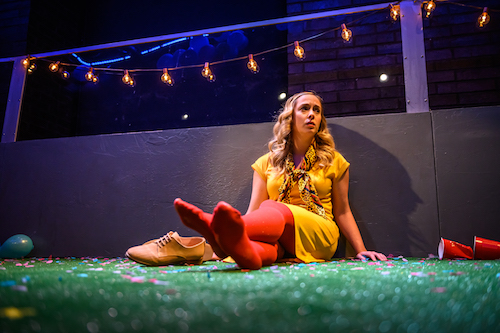
Join the office party where where “fun” is merely an attempt to keep the darkness at bay
Casimir and Caroline is based on a popular 1932 German play of the same title by Ödön Von Horváth that has never been staged in North America. Translated by Holger Syme and adapted to modern Toronto by Syme, director Paolo Santalucia and The Howland Company, it’s a satire on the emptiness of love in a time of ruthless capitalism.
An office party run amok is a catalyst for the splintering of a host of social relationships gone manipulative and wrong.
There’s a lot going on in the intimate space of Streetcar Crowsnest’s studio theatre; the stage, representing a rooftop patio, is covered with turf and strewn with Solo cups and confetti, and given a sky of helium balloons (set by Ken Mackenzie). Numerous characters weave in and out with interconnected stories.
Casimir (Alexander Crowther), a company driver (it’s not totally clear what the company does), has lost his job. When he comes to the party on the insistence of fiancée Caroline (Hallie Seline), they find themselves on the verge of implosion. Casimir’s friends, volatile Frank (Cameron Laurie) and dour Liz (Caroline Toal), have a dysfunctional relationship based on illicit activities.
Fun-seeking Caroline flirts with charmingly awkward fashion writer Sanders (Michael Ayres). Slimy, predatory boss Rankin (James Graham) jockeys for position with ambitious and icy Shira (Kimwun Perehinec). Meanwhile, the embodiment of cool Ellie (Shruti Kothari), and the desperate, forgettable HR rep Mary (Veronica Hortiguela) float through the carnage as toxic office besties. Inarticulate but sweet intern Trevor (Michael Chiem) serves popsicles and regards it all with awe.
This is a highly-modernized translation/adaptation; the play largely seems new. You can see the 1932 German influence and cadence most in Casimir’s existential moaning and self-hatred, and in vestiges such as the zeppelin reference. There’s also some archaic gender politics that the adaptation is clearly trying to combat, mostly successfully, with an extended exploration of toxic masculinity and anger in its many forms and disguises.
The actors handle the physicality of each character expertly. Rankin’s karaoke-induced meltdown is a highlight, as is Mary’s gradual devolution over the course of the evening into a twitchy mess of smeared mascara and high heel-induced injury. Trevor the tongue-tied intern who provides the evening with its one muted glimmer of hope is delightful, and Shira scores with more than one imperious takedown speech of cold fire.
Particularly in the first half, the mood is frenetic and loud, introduced by a Gogol Bordello-esque, folk-punk soundtrack. It emphasizes the manic and frenzied nature of the event, where “fun” is merely an attempt to keep the darkness at bay. Symbolized by that company-owned zeppelin that soars just out of view, the play purports that our desire to reject what feels “heavy” ultimately causes more misery in a search for false lightness and escape.
I had an issue with the play’s trajectory, the night starts at a 10 in volume and tries to go up from there. It does build, but it starts at such a high pitch, its only recourse is to go much further over the top. This feels at odds with the story itself, which is a little aimless in its wandering and wondering, with the titular relationship perhaps the least propulsive of the lot.
The actors, who are excellent at creating vivid and recognizable character types, seem to discount the small size of the theatre when projecting; the consistent shouting is so loud that I found a painkiller necessary at intermission. After intermission, volume levels are more varied and even occasionally linger in quiet, making betrayals more contemplative and chilling, with a heightened emotional impact.
A couple of choreographed dances in the first half, by Reanne Spitzer, are entertaining and crisp. It felt like a stylistic device that might have continued to great effect as a representation of the party’s increasing chaos or metaphor for conformity later in the piece, but was abandoned in the latter half of the piece.
Casimir and Caroline deals with a timely theory also which was recently espoused in Michael Schur’s television show The Good Place: that one’s environment and situation directly correspond to one’s capacity for “goodness.” That is, it’s easy to be a good person in paradise, but current workplace culture is anything but.
Those looking for the life-affirming gentle growth and sweetness of The Good Place will need to look elsewhere, however. Though the stakes here aren’t anyone’s immortal soul, the vibe is bleak and empty, poking at the rotten heart of a decadent, hollowed-out world.
But that’s the end of the Weimar Republic for you – or should we say, Weimaronto?
Details
- Casimir and Caroline plays until February 9, 2020 at the Streetcar Crowsnest Scotiabank Community Studio (345 Carlaw Ave.)
- Shows run Tuesday-Saturday at 8:00PM, with Saturday and Sunday 2:30PM matinees.
- Tickets are $25-40 and can be purchased online, at the Theatre Box Office, or by calling (647) 341-7390 ext. 1010. Select Tuesday performances have limited PWYC tickets.
- The show is approximately two hours and twenty minutes with intermission. It features mature language and content.
Photo of Hallie Seline by Dahlia Katz
